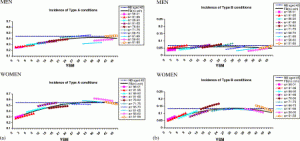Health Disparities: Aboriginals, New Immigrants, and Blacks
Despite universal healthcare in Canada, Aboriginals are most likely to experience poor health (Wilson & Rosenberg, 2002). Meanwhile, new immigrants arrive healthy, but their health declines over time (McDonald & Kennedy, 2004). Statistical grouping techniques may also hide the diminished health status of Blacks (Rodney & Copeland, 2009).
Healthcare in Canada
Universal healthcare in Canada, known as “Medicare” is administered through the provinces and territories (Health Canada, 2010).
Causal Pathways of Health Disparities:
- Social exclusion (leads to decreased mental health)
- Poverty/economic disadvantage
- Residential segregation
- Access to healthcare
Health Outcomes and Racial Salience
First Nations Peoples: Insufficient Access to Healthcare

Disparities in Health Outcomes Between First Nations people and the general population in Canada. Source: Health Canada
Research has documented the lower health outcomes of First Nations peoples who suffer from higher mortality rates and higher rates of tuberculosis–an illness that only minimally affects non-Aboriginal Canadians (Wilson & Rosenberg, 2002). One study finds that access to healthcare determines health outcomes among Aboriginals (Wilson & Rosenberg, 2002). Hence, healthcare may be inadequately provided to First Nations peoples.
The Healthy Immigrant Effect
Recent immigrants appear to be healthier than native-Canadians upon entering the country, but then health rates of immigrants decline over time (McDonald & Kennedy, 2004). Various selection processes may explain why new immigrants appear to be healthier than the rest of the population. For example, healthier people may be the ones who immigrate and medical screening by immigration officials may select for healthier individuals (McDonald & Kennedy, 2004). Once in Canada, immigrants age and use the health system, leading to the diagnosis of health conditions. Subsequently, the health rates of immigrants begins to converge with that of the general population (McDonald & Kennedy, 2004).

Health convergence as immigrants spend time in Canada. Source: McDonald & Kennedy, 2004.
Aggregate Data Hides Health Outcomes for Blacks
The commitment to multiculturalism leads Statistics Canada to publish data using broad categories such as “visible minorities” (Rodney and Copeland, 2009). However, this practice may obscure health differences between the White population and the non-White population, only providing accurate depictions of health for the White population (Rodney and Copeland, 2009). More efforts at providing disaggregated statistical accounts would provide a more accurate picture of health outcomes among different minority groups such as Blacks and Asians.


